2 speeches, 2 worlds
euinside, January 28, 2010
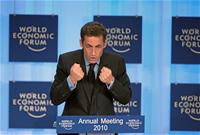 2 key speeches were held last night, marking a new stage in global
2 key speeches were held last night, marking a new stage in global 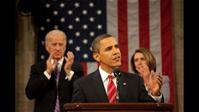 relations. One was of the French president Nicolas Sarkozy, opening the World Economic Forum in Davos, Switzerland and the other - the annual State of the Union address of president Barack Obama in Congress. Of, course it was a coincidence that both took place in one and the same day, though just a few hours form one another. But the difference in tone and priorities was not a coincidence.
relations. One was of the French president Nicolas Sarkozy, opening the World Economic Forum in Davos, Switzerland and the other - the annual State of the Union address of president Barack Obama in Congress. Of, course it was a coincidence that both took place in one and the same day, though just a few hours form one another. But the difference in tone and priorities was not a coincidence.
In Davos the French head of state made a sincere and thorough analysis of the reasons for the global financial and economic crisis and defined the measures which would help prevent it from repeating in the future - one of which was realizing that we lived in a multipolar world. However in Washington, president Barack Obama announced that the US would continue to fight for global leadership and that they would solve their problems alone and by means that would defined themselves.
And if Mr Sarkozy was something more than outspoken and inclined to admit political and business mistakes, Mr Obama was a populist, who followed one goal only - to win the American people on his side and, in the same time, to make Congress take his plans into account.
What have both said specifically?
According to Nicolas Sarkozy the crisis is not just a global crisis. It is not even a crisis in globalisation but a crisis of globalisation, caused by the assumption that the market was always right and that no other opposing factors need be taken into account, globalisation skidded out of control. "Let us look at the root of the problem: it was the imbalances in the world economy which fed the
growth of global finance. Financial deregulation was introduced in order to be able to service the
deficit of those who were consuming too much with the surplus of those who were not consuming
enough". The US is one of those countries, but president Obama did not mention in his address the reasons for the monstrous budget deficit of more than $4 trillion. He only said that when he entered the Oval office he met $1 trillion deficit. The rest $3 trillion were due to the recession.
The French head of state also said that unless banking regulation was changed, the risks for the economy would grow bigger and tougher to overcome. He underlined that because of putting free 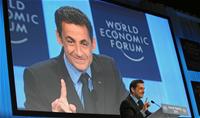 trade on a pedestal, democracy itself had been weakened and people expect democracy protect them. This is why he called for an overall reform of the international institutions so that they could respond to 21st century. "We cannot govern the world of the 21st century with the rules and principles of the 20th century. We cannot govern globalisation while relegating half of Humanity to the sidelines, without India, Africa or Latin America. Either we change of our own accord, or change will be imposed on us by economic, social and political crises", Nicolas Sarkozy warned.
trade on a pedestal, democracy itself had been weakened and people expect democracy protect them. This is why he called for an overall reform of the international institutions so that they could respond to 21st century. "We cannot govern the world of the 21st century with the rules and principles of the 20th century. We cannot govern globalisation while relegating half of Humanity to the sidelines, without India, Africa or Latin America. Either we change of our own accord, or change will be imposed on us by economic, social and political crises", Nicolas Sarkozy warned.
He also called for caution when reading the indications for economic recovery. And one more thing - besides worsening, nothing else could be reached unless mutual actions were undertaken. "How can we conceive that in a competitive world, we can insist that European banks have three times more capital to cover the risks of their market activities, without demanding the same of American or Asian banks?", the French leader asked.
According to him, the best solution would be on the basis of what's reached in G20 and Copenhagen to create corresponding number of international institutions that would oversee the future international law for the environment, employment and healthcare.
And with regard to banks regulation, Sarkozy noted that the banker's job is not to speculate, it is to analyse credit risk but they had ignore this duty of theirs. "Why take the risk of lending to
entrepreneurs when it is so easy to earn money by speculating on the markets?", Nicolas Sarkozy outlined banks' behaviour and added that president Barack Obama was right to say that banks should be deprived of the right to deal with proprietary speculation or financing speculative funds. "But this debate cannot be confined to a single country, whatever its weight in global finance. This debate must be settled within the G20".
And one more very important thing which the French president said last night - the currency. According to him it was not right in a multipolar world there to be a single benchmark currency across the globe. This is why France, which will take over the presidency of the G8 and the G20 in 2011 will initiate a reform in the international monetary system.
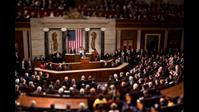 Against this background the words of Barack Obama last night sounded like a confrontation to the speech of the French head of state in Davos the evening before. The American president talked about the recession and economic crisis entirely in the context of the middle class of America and the hardships it was facing. He also told several personal stories, he focused on the letters he read each evening from Americans who had hard time to find a job, to send their kids to school and announced several new overall reforms.
Against this background the words of Barack Obama last night sounded like a confrontation to the speech of the French head of state in Davos the evening before. The American president talked about the recession and economic crisis entirely in the context of the middle class of America and the hardships it was facing. He also told several personal stories, he focused on the letters he read each evening from Americans who had hard time to find a job, to send their kids to school and announced several new overall reforms.
The first is the reform of the employment bill. Obama called on the urgent development of a new one. The White House also envisages an overall reform of the Elementary and Secondary Education Act by increasing subsidies so that more families could afford sending their children to school or college.
For Obama the discussion about the crisis lay in the context of Wall Street and Main Street, in other words banks vs. ordinary citizens. The most applauses, naturally, he got for the words that he saved the banking system in America because this was the right decision, in spite that he hated it. And more: "To recover the rest (of the money given to the banks) , I've proposed a fee on the biggest banks. Now, I know Wall Street isn't keen on this idea. But if these firms can afford to hand out big bonuses again, they can afford a modest fee to pay back the taxpayers who rescued them in their time of need".
Furthermore, Obama continued in the same tone by proposing $30 bn of the money that Wall Street returned to be used to help community banks give small businesses the credit they need to stay afloat.
So as to guarantee jobs the American president announced that he would invest more money in infrastructure. This companies that invest in clean energy and create jobs will be stimulate as well as those which create jobs in the US, unlike the companies that ship jobs oversees.
As if responding to Nicolas Sarkozy's statement about global governance and multipolar world, Barack Obama stated: "I know that there are those who disagree with the overwhelming scientific evidence on climate change. But here's the thing -- even if you doubt the evidence, providing incentives for energy-efficiency and clean energy are the right thing to do for our future -– because the nation that leads the clean energy economy will be the nation that leads the global economy. And America must be that nation".
The US will focus on export as Barack Obama's ambition is to double the export of American goods twofold in the next 5 years. For the purpose a National Export Initiative will be launched to help farmers and small businesses increase their exports, and reform export controls consistent with national security.
Not less surprising was pointing South Korea, Panama and Columbia as key partners to the US.
And regarding the heavy indebtedness of America and the enormous deficit, Barack Obama said that in 2011 he would freeze government spending for 3 years so as to return $1 trillion of the deficit he helped piling during his first year in office in an attempt to save the country from the crisis. However, the freezing will spare national security, healthcare and the social sphere.
Obama promised to make what's necessary to prevent the effect of the Supreme Court's decision of last week giving rights to lobbyists' interests to spend as much as they want in the American elections. "I don't think American elections should be bankrolled by America's most powerful interests, or worse, by foreign entities. They should be decided by the American people", Obama underlined in his 1-hour speech in Congress.
In other words, it seems that in the US the state will increase its control and that of the president, in particular. Obviously Barack Obama will focus on strong protectionist measures so as to respond to the growing popular discontent inside the nation.
On the contrary, Europe which finds it difficult to come up with a common decision on a European territory, insists for a global regulation and for equalization of standards so that international trade could become more fair. But still we haven't heard the words of China, India, Brazil and Russia which, for sure, have their own plans for the world and their place in it.
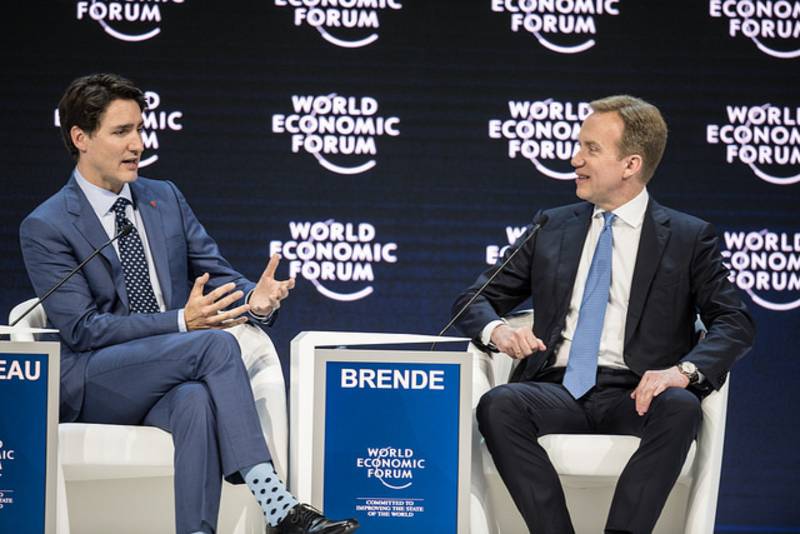 Justine Trudeau | © WEF
Justine Trudeau | © WEF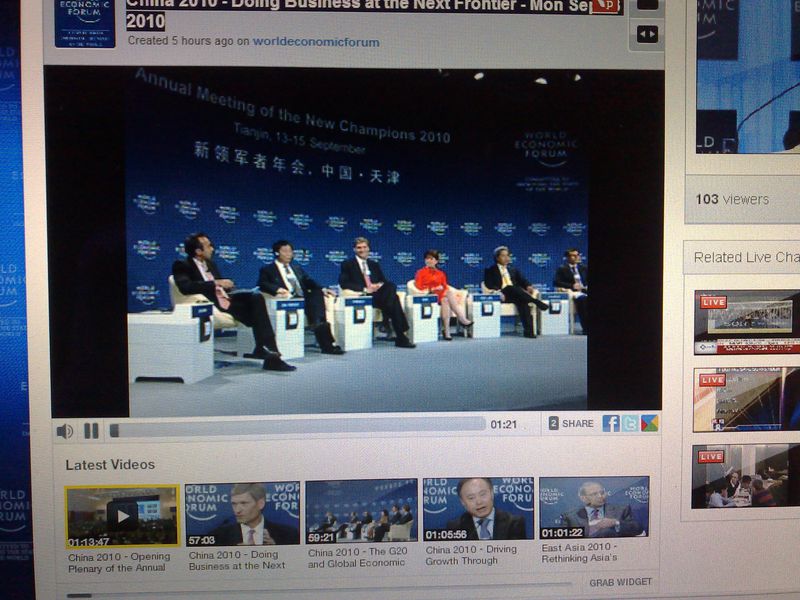 | © euinside
| © euinside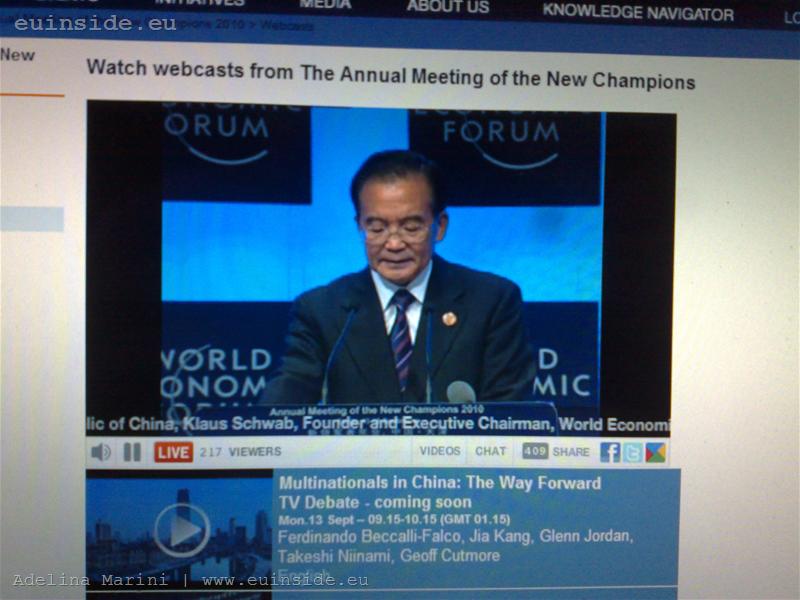 | © euinside
| © euinside